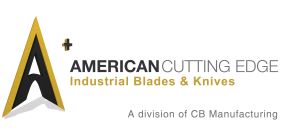When it comes to industrial knives and blades, material selection matters. The purchase of industrial machine knives and blades is often driven by price because the decision-maker is unaware of the benefits of using a different and more suitable material. Let's be honest, two knives of different materials look very similar. Sometimes, it's very difficult to tell them apart. But, the fact is that materials behave differently in cutting applications.
Varying factors contribute to the decision to use a different material. Those factors range from a need for better wear resistance, more accurate cutting, or superior slit quality just to name a few. One recurrent customer question across all of the industries we serve is how to get better performance and life out of industrial machines knives and blades. And, our answer is always the same. "It depends on what your goals are for your cut quality and consistency." After that quick answer, we invest the time with our customers to ask the right questions about their cutting operation to learn what's working, what isn't working, and what they want to achieve.
Carbide or Is It Tungsten Carbide?
One option that sometimes meets the rigorous demands of our customers is carbide. But, did you know that it's technically incorrect to call the material "carbide?" It's true. Technically speaking, all carbides are a composition of two elements – tungsten and a binder material, usually cobalt, in the final mix to provide strength. Through the process of sintering, these ingredients are mixed and heated in a furnace at temperatures from 2500 to 2900° F. Therefore, the correct term for this material is tungsten carbide.
Landing on which material will provide the best cut and life for your industrial application is no easy task. It's critical to work with an industrial knife supplier that truly understands what composites are most suitable for your application over others. The ingredients in carbide vary and within them are different grades. There are so many options that it's not easy to take into consideration everything you should when trying to find the right material.
We've put together a short list of pros and cons for tungsten carbide industrial knives and blades. Use this list as a general guide but keep in mind that working with industrial knife and industrial blade experts is the best and safest option for making certain you're using the appropriate material for your cutting application.
Pro: High Wear Resistance
If you're looking for wear resistance, then carbide might be a good bet for your industrial cutting operation. Wear resistance is how hard it is to remove material by wear.
Con: Low Toughness
If you want something with high toughness, carbide isn't likely to be your go-to material. Toughness expresses the ability to sustain shocks, suddenly applied and relieved loads, or major impacts, without breaking. Often, materials with high wear resistance have low toughness.
Pro: Fewer Knife and Blade Changes
Because of carbide's tendency to wear well, there is often less need to change machine knives as often. The reduction of downtime for maintenance of blades contributes to higher volume and more profitability.
Con: Price of Carbide
There's no question that the cost of carbide knives and blades is higher per item than some other options. However, when you take into consideration the increased productivity and fewer overall blade and knife changes, the cost of the carbide blades or knives may just pay for itself.
To further reduce the cost of a solid carbide blade, many customers choose a carbide braze. The process of brazing involves joining two or more metals together by melting and flowing a filler metal into a joint.
Pro: Efficiency via Cutting Edge Retention
Carbide or carbide tipped cutting tools are more efficient compared to high speed because they retain their cutting edge hardness at high machining temperatures.
Con: Difficult to Sharpen
While carbide wears longer than other materials, once it becomes dull it can be very difficult to sharpen solid carbide or brazed carbide edges.
Protect Your Investment
You've invested a lot in your industrial cutting operation regardless of the industry or industries you serve. Make sure you're working with an industrial knife supplier with expertise in metallurgy who wants to build a partnership with you to truly understand your business objectives and goals. With over 50 years of industrial knife and blade manufacturing experience across a wide range of industries, American Cutting Edge has the right solution to help you meet and exceed your goals.
Contact us today for more information about how we can help you optimize your cutting application with the right material for your industrial machine knives and razors.




